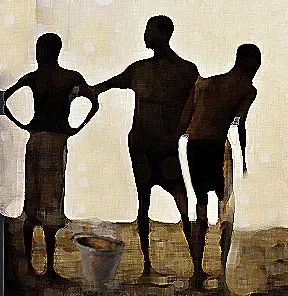Three Brothers and the Pot of Porridge is a popular African folktale.
The Three Brothers and the Pot of Porridge African Folktale
Three brothers were traveling through the dense rainforest jungle. They had been traveling on foot for almost a full day and night was falling. They needed a suitable place to rest for the night, a place where they would be safe from prowling animals of the night.
They were in luck because before darkness fell, they spotted a little isolated hut in the distance. When they arrived at the hut, they met a kindly old woman who invited them in and offered them a place to spend the night.
The old woman offered them some porridge, which she was cooking in an iron pot over some firewood. The brothers declined for they were very exhausted and also did not want to impose on this old woman who living alone, had cooked enough porridge only for one person.
The old woman gave them some mats and showed them into a room where they could lay down and have a good night’s rest. Soon, the entire hut was dark and everyone in it was asleep.
Sometime in the night, the youngest of the three brothers woke up and he was very hungry. His older brothers had declined the offer of some supper and he had just gone along, but he was hungry.
So he went out into the kitchen to see if any of the porridge remained and indeed, there was enough porridge in there for one person.
It appeared that the old woman had not eaten any of it, she must have been keeping it for the next day. It would not harm anybody if he ate just a little bit of it, and it would certainly do him a lot of good.
Therefore, he ate a little bit. Then a little bit more, and even more until it was all gone. Realizing his folly, he decided to cover it up and went out to pick some stones to put in the pot. He hoped the old woman would not notice.
The three brothers were up early the next morning to continue on their journey. They bade farewell to the old woman and thanked her for her kindness.
The old woman discovered the stones in her pot soon after the brothers left and immediately set out after them. Even though she was very old, she could move as fast, or maybe even faster than any young man since she was able to catch up with the three young men.
She accused them of stealing her porridge and filling her pot with stones, at which the eldest brother who spoke for them sincerely denied. The old woman though was certain that one of them performed the deed, so she challenged them to take a test. They went to a nearby river which had a log laying across it. Each one of them would walk across the river on the log while singing a song which the woman taught to them.
They would each sing this song in Yoruba: Ti m ba je koko arugbo If I ate the the old woman’s cocoyam Ki okun gbe mi, ki okun la mi Let the sea take me
The first two brothers walked confidently across the river singing the song. But the youngest brother was so scared as he walked and sang. His step faltered several times and he eventually fell into the river.



























